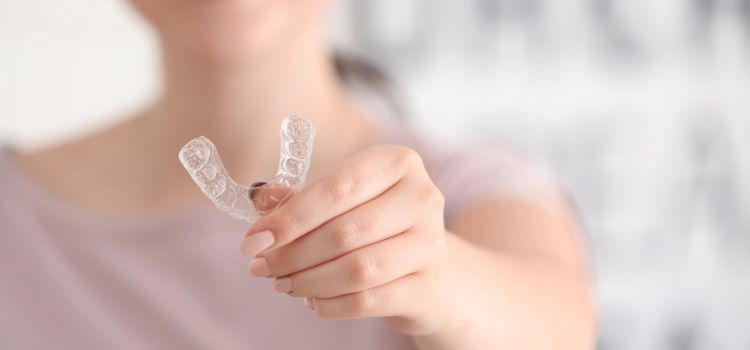Bruxism During Pregnancy
21st May 2025

Pregnancy comes with many changes—and for some, that includes grinding or clenching teeth. If you’ve noticed jaw pain, morning headaches, or tooth sensitivity while expecting, you might be dealing with bruxism, also known as teeth grinding.
Bruxism during pregnancy is common and manageable. This guide covers why it happens, symptoms to watch for, and safe ways to relieve discomfort.
What Is Bruxism and Why Does It Happen During Pregnancy?

Bruxism is the involuntary grinding or clenching of teeth, often during sleep. It can lead to jaw pain, headaches, tooth wear, and other discomforts.
During pregnancy, several factors may increase the chances of developing bruxism:
Hormonal changes
Shifts in hormone levels can affect muscle tension and sleep quality, both of which can trigger teeth grinding.
Increased stress or anxiety
Many pregnant individuals experience stress or worry, especially in the first and third trimesters. Stress is a common cause of bruxism.
Sleep disruptions
Pregnancy often affects sleep, and poor sleep is linked to nighttime teeth grinding.
Jaw tension
Hormonal changes, swelling, or changes in posture during pregnancy can contribute to jaw tightness.
Note: Some people may experience bruxism for the first time during pregnancy, while others may find that existing teeth grinding gets worse.
Related Articles:
- Teeth Feel Weird? 5 Common Issues
- The Relationship Between Bruxism and Stress
- Sleep Study for Bruxism
Common Symptoms of Pregnancy-Related Bruxism
Bruxism during pregnancy often develops gradually, and many people don’t realize they’re grinding their teeth until symptoms appear. These signs can range from mild discomfort to more persistent pain.
Common symptoms include:
- Jaw pain or tightness, especially in the morning
- Headaches, often around the temples or behind the eyes
- Tooth sensitivity when eating hot, cold, or sweet foods
- Worn-down or flattened teeth
- Earaches or a feeling of pressure near the ears
- Popping or clicking sounds when opening the mouth (possible TMJ involvement)
- Interrupted sleep or waking with tension in the face or jaw
Note: Untreated bruxism can lead to long-term tooth damage and jaw issues, so early care is important—even during pregnancy.
Is Bruxism During Pregnancy Harmful?
Bruxism itself isn’t usually dangerous, but it can lead to problems if left untreated—especially during pregnancy when your body is already under extra stress.
Here’s what you should know:
Tooth damage: Continuous grinding can wear down enamel, cause chips or cracks, and increase tooth sensitivity.
Jaw strain: Ongoing clenching may lead to jaw pain, stiffness, or temporomandibular joint (TMJ) issues.
Sleep disruption: Bruxism can make it harder to get quality rest, which is important for both you and your baby.
Increased stress: Pain and poor sleep can create a cycle of stress, which may worsen symptoms.
Bruxism doesn't directly harm your baby, but the discomfort and sleep disturbances it causes can affect your overall well-being. That’s why it’s important to manage it early with safe, pregnancy-friendly solutions.
Note: If you’re unsure whether your symptoms are related to bruxism, a dental check-up can help rule out other issues and confirm the cause.
Safe and Natural Relief for Bruxism During Pregnancy

Managing bruxism while pregnant is possible with gentle, non-invasive strategies that support your health and comfort. Here are safe ways to relieve teeth grinding during pregnancy:
Use a Custom Night Guard
Wearing a night guard can reduce pressure on your teeth and jaw while you sleep. A custom-fit night guard offers better comfort and protection compared to over-the-counter options. It’s a safe, non-medicinal solution often recommended by dentists.
Reduce Stress and Anxiety
Stress can make teeth grinding worse during pregnancy. To manage it, try safe options like prenatal yoga, deep breathing, meditation, calming music, or talking with a counselor. These can help you relax and feel more comfortable.
Apply Warm Compresses
Place a warm towel or heat pack on your jaw for 10–15 minutes, especially before bed. This helps relax tight jaw muscles and reduce pain.
Practice Gentle Jaw Exercises
Light stretching and movement can relieve tension in your jaw and help prevent clenching. Ask your dentist or doctor about exercises that are safe during pregnancy.
Improve Sleep Habits
Better sleep can help reduce nighttime teeth grinding. Keep a regular bedtime routine, avoid screens before bed, and use a supportive pillow. Try to sleep in a position that keeps your head and jaw aligned to ease tension.
Avoid Common Triggers
Avoiding common triggers can help with bruxism during pregnancy. Try cutting back on caffeine later in the day, avoid chewing gum or biting your nails, and drink plenty of water to keep your muscles relaxed.

- Most Popular
- Hard Outside, Soft Inside
- 2MM Thick
- Moderate / Heavy

- Most Durable
- Hard Materials
- 1.5MM Thick
- Heavy / Severe

- For Day Time Use
- Thin, Barely Visible
- 1MM Thick
- Light / Moderate

- For Clenching
- Flexible & Soft
- 1.5MM Thick
- Light / Moderate
Can You Wear a Night Guard While Pregnant?
Yes, wearing a night guard during pregnancy is safe and often recommended to help manage bruxism. Night guards act as a protective barrier between your upper and lower teeth, reducing the damage caused by grinding and clenching while you sleep.
Why Night Guards Are Helpful During Pregnancy
- Protect your teeth from wear or cracks
- Relieve jaw pain and tension
- Reduce headaches and facial soreness
- Improve sleep quality by minimizing nighttime discomfort
Custom vs. Over-the-Counter Night Guards
While over-the-counter guards are widely available, they’re often bulky and less comfortable. A custom night guard, made using a mold of your teeth, fits securely and is more effective—especially if you're dealing with increased sensitivity or gum tenderness during pregnancy.
Note: Wearing a night guard is a non-invasive, drug-free way to get relief from pregnancy-related bruxism. If you're unsure about starting one, check with your dentist or healthcare provider.
Related Articles:
- Guide to Choosing the Right Night Guard
- Wearing a Night Guard: Pros and Cons
- How Should a Night Guard Fit?
When to See a Dentist or Healthcare Provider
While mild bruxism can often be managed at home, there are times when it’s best to seek professional help—especially during pregnancy when your health needs extra attention.
See a dentist or healthcare provider if you:
- Have persistent jaw pain or tightness
- Notice cracked, chipped, or worn-down teeth
- Experience frequent headaches or earaches
- Have trouble sleeping due to discomfort
- Hear clicking or popping sounds in your jaw
- Feel your symptoms are getting worse
A dentist can confirm if bruxism is the cause of your symptoms and recommend safe, pregnancy-friendly treatments. They may also check for signs of TMJ disorders or other dental concerns that need attention.
Note: If you’re pregnant, be sure to let your dentist and doctor know before starting any new treatment. They can work together to ensure your care plan is safe for you and your baby.
Does Pregnancy-Related Bruxism Go Away After Birth?
In many cases, bruxism that begins during pregnancy improves or goes away after childbirth. Once hormone levels balance out and stress levels decrease, teeth grinding often becomes less frequent or stops entirely.
However, for some people, symptoms may continue—especially if stress, sleep issues, or jaw tension remain after delivery.
What to Expect Postpartum:
- Hormones stabilizing may reduce muscle tension and anxiety
- Improved sleep can help reduce nighttime grinding
- Ongoing stress (from caring for a newborn) may still trigger clenching or grinding
- Dental check-ups are important to assess any damage and plan long-term care
Note: If symptoms persist after pregnancy, continue using your night guard and speak with a dentist about next steps. Early treatment can prevent long-term damage to your teeth and jaw.
Final Thoughts: Managing Bruxism Safely During Pregnancy
Bruxism during pregnancy is common and often linked to hormonal changes, stress, and sleep disturbances. While it can be uncomfortable, there are safe and effective ways to manage it without putting your health—or your baby’s health—at risk.
Simple steps like using a custom night guard, reducing stress, and improving sleep habits can make a big difference. If symptoms persist or worsen, talk to your dentist or healthcare provider for guidance.
Taking care of your teeth and jaw now can help you stay more comfortable throughout pregnancy and prevent long-term dental issues.
Looking for a safe, effective solution? Pro Teeth Guard offers custom night guards made in a dental lab—perfect for managing bruxism during pregnancy from the comfort of your home.

- Most Popular
- Hard Outside, Soft Inside
- 2MM Thick
- Moderate / Heavy

- Most Durable
- Hard Materials
- 1.5MM Thick
- Heavy / Severe

- For Day Time Use
- Thin, Barely Visible
- 1MM Thick
- Light / Moderate

- For Clenching
- Flexible & Soft
- 1.5MM Thick
- Light / Moderate
